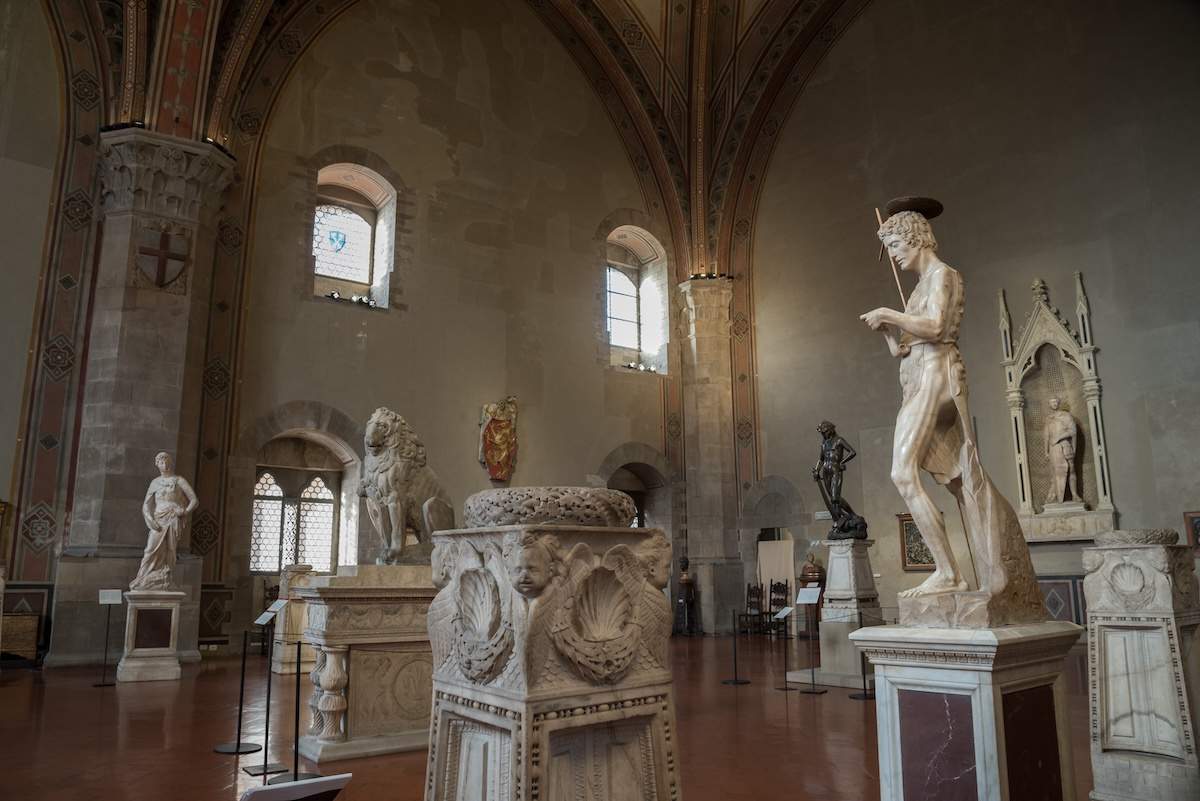Florence, Bargello's Donatello Hall to close nearly five months for restoration and refitting work
The Salone di Donatello at the Bargello National Museum in Florence closes to the public from June 5 until the end of October to allow for major restoration and refitting work that has been planned for some time. The most impressive room in the museum’s itinerary holds masterpieces of Donatello’s production, such as the bronze David, the marble David, the St. George, the Amore-Attis, the Marzocco and the Madonna of Via Pietrapiana, recently purchased for the museum by the Ministry of Culture, in addition to the most celebrated by other masters of the time, such as Verrocchio’s David, a vast collection of Della Robbia, Ghiberti’s and Brunelleschi’s panels, and many more, for a total of 67 works. During the period when the museum is closed to the public, a core of thirteen masterpieces (ten reliefs and three bronze statues) will be moved to one of the two exhibition rooms on the ground floor of the museum to still allow visitors to view them. The ground-floor room will be accessible starting June 7 and for the duration of the work.
The works follow those already carried out at the Hall of Ivories, the Magdalene Chapel, the Sacristy, the Medieval Sculpture Room, the Medagliere and Baroque Room, the Islamic Room and the Hall of Majolica (the latter two, almost completed) and are part of the program of major works developed since 2016 in the five venues of the Bargello Museums. In the Hall of Donatello, the works, financed with the Administration’s own funds for a total of 300,000 euros, will be very demanding as they consist of the renovation of nearly 1,000 square meters of surfaces divided into 800 square meters of walls and 180 of vaulted ceilings. They will be conservative maintenance work on the plastered and painted surfaces, from widespread cleaning to the removal of existing paintwork unsuitable for conservation, from the consolidation of portions of plaster to the plastering of cracks to the lime staining of the surfaces to even out the final effect of the vaulted walls or ceilings. As for the decorated surfaces (about 200 square meters), dry cleaning is planned, with subsequent mimetic chromatic reintegration of the gaps.
The intervention will also have to maintain the evidence of masonry traces, still visible on the north wall, corresponding to the ancient subdivision into cells, dating back to the time when the building was used as a prison, which involved a subdivision in height of the Hall into four floors, each including thirty-two cells. In 1574, in fact, at the end of the principality of Cosimo I de’ Medici, the building was used as a prison and as the seat of the “Bargello,” or chief of police. Only restorations begun in 1858 and completed in 1865 restored the palace-and the Salone-to its original splendor, ready to house the first National Museum of the Kingdom of Italy.
The design of the restorations included a commission for the Direction of Works and Safety Coordination entrusted to Studio Sertec S.A.S. di Messina C. e Paolini L. and involved a complex organization of the handling and securing of the 67 works in the Salone, preliminary to the construction of the extensive scaffolding. A partial restoration of the painted surfaces affecting the lower band of the adjoining Verone will also be carried out during the work.
The Salone di Donatello will therefore reopen with a renewed layout that will enjoy the new lighting system created thanks to the generous donation of 166,183.52 euros offered to the museum by the Friends of the Bargello in 2022.
To allow visitors to continue to admire the masterpieces housed in the Hall, a selection of the most representative works, with a focus on sculpture by Donatello and some of his contemporaries, will be set up inside one of the exhibition rooms on the ground floor, curated by Ilaria Ciseri, head of collections at the Bargello National Museum, and open to the public starting June 7. On the two days of June 5 and 6 only, to allow for handling and set-up, the public will neither be able to enter the Hall nor access the selection displayed on the ground floor. Three outstanding masterpieces of Florentine sculpture will be placed in the center of the hall: Donatello’s David, the Amore-Attis, and Andrea del Verrocchio’s bronze David. Three reliefs by Luca della Robbia, the two gilded bronze panels executed by Filippo Brunelleschi and Lorenzo Ghiberti in 1401, will take their place on the walls, alongside the two painted terracotta high-reliefs made by Dello Delli and Michele da Firenze in the third decade of the 15th century. And again, two works by Donatello: the bas-relief with the Crucifixion and the Madonna of Via Pietrapiana, which is followed to close the group by one of Donatello’s best pupils, Desiderio da Settignano, with his Panciatichi Madonna.
Pictured is Donatello’s Salone at the Bargello National Museum. Photo by Fabiana Priviter
 |
| Florence, Bargello's Donatello Hall to close nearly five months for restoration and refitting work |
Warning: the translation into English of the original Italian article was created using automatic tools. We undertake to review all articles, but we do not guarantee the total absence of inaccuracies in the translation due to the program. You can find the original by clicking on the ITA button. If you find any mistake,please contact us.





























